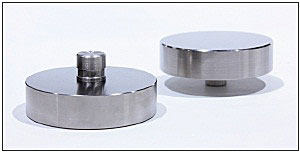Fixed Compression Plates

Features:
- Applicable for compression and cycle testing a diverse range of materials and finished products
- Available in diameters of 50 mm (2.0 in), 100 mm (3.9 in), and 200 mm (7.9 in)
- 250 kN (55,000 lbf) maximum capacity
- Hardened faces ensure minimal wear
Relevant Materials:
Plastics, Metals, Rubber, Lumber, Cement
Relevant Specimens:
Cylinders, Cubes, Cuboids
Fixed compression plates, or platens as they are otherwise known, are versatile testing accessories, applicable to compression and cycle testing a diverse range of materials and finished products. Hardened faces, surface hardness of 60 on the Rockwell HRC scale, ensure minimal wear, preserving surface smoothness.
These general-purpose fixed compression plates are available in diameters of 50 mm (2.0 in), 100 mm (3.9 in), and 200 mm (7.9 in). Lower compression plates fit into the table of the universal tester. Upper 50 mm and 100 mm compression plates attach directly to compression and bending loading jigs.
For 200 mm upper compression plates, an additional screw joint is required. This joint attaches the plate to compression and bending loading jigs and should be ordered to match the capacity of the compression and bending loading jig.
Fixed compression plate kits, which, in addition to upper and lower compression plates, include a compression and bending loading jig, are available in certain regions. Please contact your local Shimadzu representative for information about fixed compression plate kits.
News / Events
-
AUTOGRAGH AGS-X2 Series has been released
The Shimadzu AUTOGRAPH AGS-X2 series provides superior performance and practical testing solutions for a wide array of applications. Offering high-level control and intuitive operation, the AGS-X2 series sets a new standard for strength evaluations while providing the utmost in safety considerations in a modern, stylish design.
-
AUTOGRAGH AGS-V Series has been released
Shimadzu Corporation released the Autograph AGS-V Series precision universal testing machine. In this series, the range over which the force measurement accuracy is guaranteed has been increased by a factor of two compared with existing machines. As a result of this new function, the work required to change force measurement sensors and accessories required for measurement can be reduced.
-
High-Speed Video Camera HyperVision HPV-X3 has been released
Recording speed of 20 million frames/second, the highest in its class provides larger, clearer, high-sensitivity recording. HPV-X3 is equipped with a synchronized recording function and high-level analytical capabilities that accommodate a variety of software programs.
-
New Video: AUTOGRAPH AGX-V2 Voice Operation Device XV-Talk
We will introduce how XV-Talk, the world's first voice control device installed in Shimadzu's latest tensile tester AGX-V2, can be used in various scenarios.
-
New Video: AUTOGRAPH AGX-V2 Operation Control Panel Stand-alone test feature
We will introduce a new feature of Shimadzu's latest tensile tester, AGX-V2, a stand-alone testing function using a large color LCD touch panel.
-
New Autograph AGX-V2 Series Precision Universal Testing Machines
The World’s First Testing Machines Equipped with a Voice Operation Device


